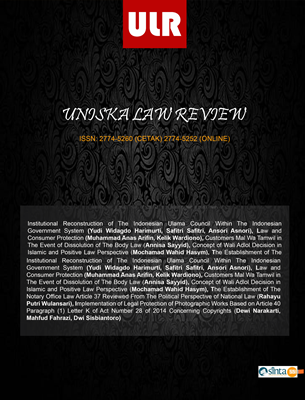Law Enforcement of Cracking Criminal Actions from The Perspective of Special Criminal Law in Indonesia
Main Article Content
Abstract
The development of information technology has not only positive but also negative impacts in the form of the emergence of cracking crimes. Although in Indonesia there are provisions that accommodate cracking, there are still obstacles in enforcing the law. This study aims to analyze the legal regulations for cracking crimes and the effectiveness of legal protection regulations for victims of cracking crimes from the perspective of special criminal law in Indonesia. The type of research used is normative legal research. The results of this study indicate that first, related to cracking crimes in Indonesia, it has been accommodated through Article 30 paragraph (3) and Article 46 paragraph (3) of the ITE Law 19/2016. Meanwhile, the PDP Law does not explicitly accommodate cracking crimes. However, Article 65 paragraph (1) and Article 67 paragraph (1) of the PDP Law imply elements of cracking acts in the form of illegal access to personal data. The effectiveness of the ITE Law 19/2016 and the PDP Law is still not sufficient in combating cracking crimes and providing legal protection for victims. This is a challenge for the police. The challenges are classified into four aspects of obstacles, namely: the investigation aspect, the evidence aspect, the facilities aspect, and the jurisdiction aspect. Efforts to overcome these obstacles are: (1) Special training is needed to provide investigators with an understanding of the cyber world; (2) Expert skills are needed with the help of the latest technology to analyze evidence that is at risk of being easily modified, deleted, or hidden by the perpetrator; (3) Facilities are needed that can support police performance through optimizing digital forensic skills; and (4) More attention is needed to mapping places/physical areas related to the occurrence of cybercrime.
Article Details
How to Cite
SALSABILLA, Anggi Afrita; HARIYANA, Trinas Dewi; MANFALUTHI, Agus.
Law Enforcement of Cracking Criminal Actions from The Perspective of Special Criminal Law in Indonesia.
UNISKA LAW REVIEW, [S.l.], v. 5, n. 2, p. 173 - 189, june 2025.
ISSN 2774-5252.
Available at: <https://ejournal.uniska-kediri.ac.id/index.php/SJ/article/view/7047>. Date accessed: 05 mar. 2026.
doi: https://doi.org/10.32503/ulr.v5i2.7047.
Section
Articles
References
1. Books
Portefield, Jason. White and Black Hat Hacker. First edit. New York: The Rosen Publishing Group, Inc., 2017.
2. Journals
Cok Rai Kesuma Putra, I Nyoman Gede Sugiartha, and I Made Minggu Widyantara. “Legal Analysis of the Validity of Criminal Responsibility for Perpetrators of Computer Security Data System Hacking (Cracking).” Journal of Legal Preferences 5, vol. 1 (2023): page 1–7. https://doi.org/10.22225/jph.5.1.8636.1-7.
Hamdani, Fahri, Yasinta Bella Fitriana, and Nabila Oper. “KLIK: Kajian Ilmiah Informatika Dan Komputer Website Security Analysis Against DDOS Attacks Using National Institute of Standards and Technology (NIST) Methods.” Media Online) 3, vol. 6 (2023): page 1296–1302. https://doi.org/10.30865/klik.v3i6.830.
Hidayatullah, Tri Andika, Ismansyah, and Nani Mulyati. “Legal Protection for Victims of Hacking Crimes Related to Data Theft.” Unes Law Review 6, vol. 1 (2023): page 1356–1366.
Murti, Hari. “Cybercrime-2214-Article Text-1828-1-10-20140306” X, vol. 1 (2005): page 37–40.
Sa’diyah, Nur Khalimatus. “Modus Operandi of Cracker Crimes According to the Electronic Information and Transactions Law.” Perspektif 17, vol. 2 (2012): page 78. https://doi.org/10.30742/perspektif.v17i2.97.
Salsa, Anandhia. “Legal Review of Human Rights Protection in Cybercrime Cases.” Triwikrama: Journal of Social Sciences 01, vol. 3 (2023): page 23–40. https://umsu.ac.id/hak-asasi-manusia/.
Suhaemin, Amin, and Muslih. “Characteristics of Cybercrime in Indonesia.” EduLaw : Journal of Islamic Law and Yurisprudance 5, vol. 2 (2023): page 15–26.
Unggul, Satria, and Wicaksana Prakasa. “DOKTRINA Legal Protection of Personal Data and Responsibility of Authorities For” 7, vol. 27 (2024): page 179.
3. Act
Republic, State. Law Number 27 of 2022 Concerning Personal Data Protection (2022).
Law Number 11 of 2008 concerning Electronic Information and Transactions, Pub. L. No. 11.
4. Website
Affairs, Office of Public. “Cracked and Nulled Marketplaces Disrupted in International Cyber Operation,” n.d. https://www.justice.gov/opa/pr/cracked-and-nulled-marketplaces-disrupted-international-cyber-operation.
Hukum Online. “Legal Traps for Cracking Perpetrators According to the PDP Law and ITE Law,” 2024. https://www.hukumonline.com/klinik/a/jerat-hukum-pelaku-icracking-i-menurut-uu-pdp-dan-uu-ite-lt4f235fec78736/.
Indonesias, CNN. “What is the DDoS attack that paralyzed the KPU website for more than 24 hours?,” 2024. https://www.cnnindonesia.com/teknologi/20230509134321-192-947190/apa-itu-serangan-ddos-yang-bikin-situs-kpu-lumpuh-lebih-dari-24-jam#goog_rewarded.
Portefield, Jason. White and Black Hat Hacker. First edit. New York: The Rosen Publishing Group, Inc., 2017.
2. Journals
Cok Rai Kesuma Putra, I Nyoman Gede Sugiartha, and I Made Minggu Widyantara. “Legal Analysis of the Validity of Criminal Responsibility for Perpetrators of Computer Security Data System Hacking (Cracking).” Journal of Legal Preferences 5, vol. 1 (2023): page 1–7. https://doi.org/10.22225/jph.5.1.8636.1-7.
Hamdani, Fahri, Yasinta Bella Fitriana, and Nabila Oper. “KLIK: Kajian Ilmiah Informatika Dan Komputer Website Security Analysis Against DDOS Attacks Using National Institute of Standards and Technology (NIST) Methods.” Media Online) 3, vol. 6 (2023): page 1296–1302. https://doi.org/10.30865/klik.v3i6.830.
Hidayatullah, Tri Andika, Ismansyah, and Nani Mulyati. “Legal Protection for Victims of Hacking Crimes Related to Data Theft.” Unes Law Review 6, vol. 1 (2023): page 1356–1366.
Murti, Hari. “Cybercrime-2214-Article Text-1828-1-10-20140306” X, vol. 1 (2005): page 37–40.
Sa’diyah, Nur Khalimatus. “Modus Operandi of Cracker Crimes According to the Electronic Information and Transactions Law.” Perspektif 17, vol. 2 (2012): page 78. https://doi.org/10.30742/perspektif.v17i2.97.
Salsa, Anandhia. “Legal Review of Human Rights Protection in Cybercrime Cases.” Triwikrama: Journal of Social Sciences 01, vol. 3 (2023): page 23–40. https://umsu.ac.id/hak-asasi-manusia/.
Suhaemin, Amin, and Muslih. “Characteristics of Cybercrime in Indonesia.” EduLaw : Journal of Islamic Law and Yurisprudance 5, vol. 2 (2023): page 15–26.
Unggul, Satria, and Wicaksana Prakasa. “DOKTRINA Legal Protection of Personal Data and Responsibility of Authorities For” 7, vol. 27 (2024): page 179.
3. Act
Republic, State. Law Number 27 of 2022 Concerning Personal Data Protection (2022).
Law Number 11 of 2008 concerning Electronic Information and Transactions, Pub. L. No. 11.
4. Website
Affairs, Office of Public. “Cracked and Nulled Marketplaces Disrupted in International Cyber Operation,” n.d. https://www.justice.gov/opa/pr/cracked-and-nulled-marketplaces-disrupted-international-cyber-operation.
Hukum Online. “Legal Traps for Cracking Perpetrators According to the PDP Law and ITE Law,” 2024. https://www.hukumonline.com/klinik/a/jerat-hukum-pelaku-icracking-i-menurut-uu-pdp-dan-uu-ite-lt4f235fec78736/.
Indonesias, CNN. “What is the DDoS attack that paralyzed the KPU website for more than 24 hours?,” 2024. https://www.cnnindonesia.com/teknologi/20230509134321-192-947190/apa-itu-serangan-ddos-yang-bikin-situs-kpu-lumpuh-lebih-dari-24-jam#goog_rewarded.
